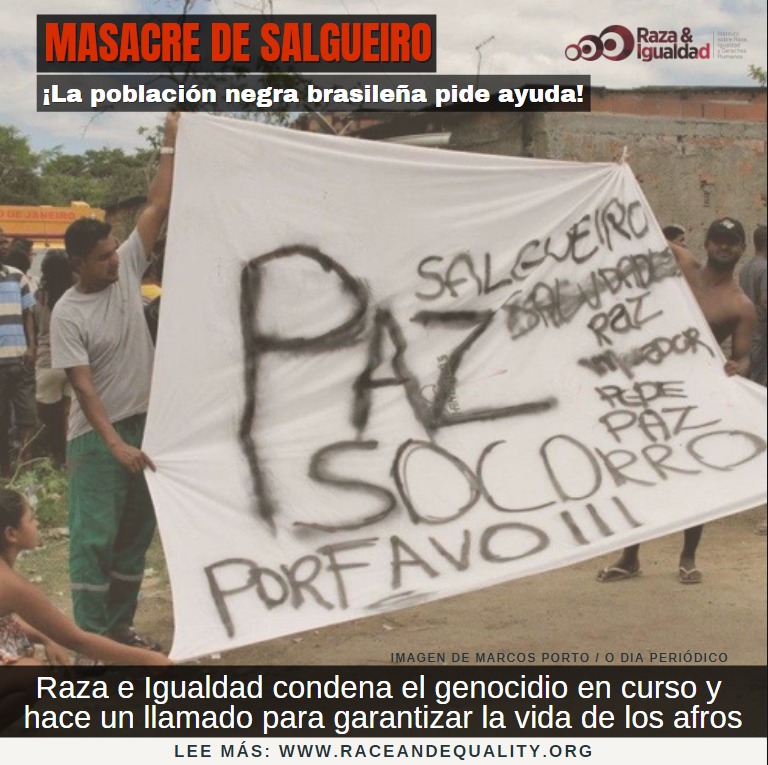Political Prisoners in Nicaragua: Three Campesinos Sentenced to 216, 210, and 159 Years in Prison
Washington, DC, February 18, 2019 – Medardo Mairena and Pedro Mena, two leaders of the Movimiento Campesino [Campesino Movement] arrested in July for demanding justice and democracy from the government of Nicaragua after the brutal governmental repression of civic protests, were sentenced today to 216 and 210 years in jail, sentences that are considered excessive for defendants in Nicaragua, given that life sentences do not exist in that country and the maximum sentence permitted under the [Nicaraguan] Constitution is 30 years.
The campesinos had been declared guilty on December 17, 2018 of the crimes of terrorism, organized crime, assassination, simple kidnapping, robbery, and hindering public services. The defense lawyers who represented the campesinos, as well as experts in this field, viewed it as the end of a trial lacking guarantees, filled with contradictions, false witnesses, and evidence tampering.
According to local media, the sentence was announced by Judge Edgard Altamirano of the Ninth Criminal Trial District of Managua, who additionally sentenced a third campesino by the name of Luis Pineda Icabalzeta to 159 years in prison.
In December, a fourth defendant named Silvio Saúl Pineda Bonilla was declared not guilty of the crimes of which he had been accused.
The lawyer defending Mairena and Mena, Julio Montenegro of the Comisión Permanente de Derechos Humanos [Permanent Commission on Human Rights] (CPDH), declared last December to local media that Judge Altamirano “had the ruling already prepared,” which he read immediately following the closing arguments.
Mairena, Mena, and Pineda are some of the more than 760 political prisoners recorded by the Comité Pro Liberación de Presos y Presas Políticas de Nicaragua [Committee in Favor of Freeing Nicaraguan Political Prisoners] up through February of this year. These three campesinos bring the total to more than 140 political prisoners who have already been sentenced. Their crime, affirm their relatives, has been to protest with the flag of Nicaragua in their hands.
A Medardo Mairena las autoridades de #Nicaragua lo consideran "terrorista" por exigir justicia y democracia. Demandamos una #NavidadSinPresosPoliticos pic.twitter.com/mnjlrDdfd0
— Race and Equality (@raceandequality) December 18, 2018
Pedro Mena también es un líder campesino y su condena arbitraria es un síntoma de la pérdida del Estado de derecho en #Nicaragua. Demandamos una #NavidadSinPresosPoliticos pic.twitter.com/sojieyFF0E
— Race and Equality (@raceandequality) December 18, 2018
Who are they?
Mairena represented campesinos in the Civic Alliance for Justice and Democracy, a group of citizens, students, businesspersons, and activists who participated in the National Dialogue with the Government to seek a way out of the socio-political and human rights crisis that by May had left 56 dead. As of this writing, State repression has left at least 325 dead, more than 2,000 people injured, and more than 50,000 who have sought refuge in Costa Rica.
In addition, Medardo was the coordinator of the National Council in Defense of the Land, the Lake, and Sovereignty, a group of campesinos who have fought since 2014 for the repeal of Law 840 that grants a Chinese company permission to build and operate an interoceanic canal that would destroy dozens of rural communities in Nicaragua.
Mena also belonged to the Civic Alliance for Justice and Democracy, serving as an advisor to Mairena, and was part of the campesino movement opposed to the canal project.
According to the Public Prosecutor’s accusation, quoted by the newspaper La Prensa, Medardo Mairena was the head of a “criminal group” that guided the creation of roadblocks in Boaco, Chontales, Nueva Guinea, and Río San Juan to prevent the normal operation of transportation and commit various crimes. In addition, he is accused of being the mastermind of the murder of five police officers and a civilian in the municipality of Morrito, in Río San Juan on July 12, 2018.
Although Medardo Mairena openly supported the creation of barricades or roadblocks, they were actually installed by the campesino movement, students, and citizens throughout the country as a form of civic protest against governmental repression. Residents of Morrito, according to the digital media outlet Confidencial, attribute the assassinations to parapolice officers allied with the government who attacked a peaceful march that same day. Relatives of Mairena and Mena say they are being criminalized for actively participating in demonstrations against the regime of Daniel Ortega and Rosario Murillo, as well as for the public demands for justice and democracy that were issued as a result of acts of repression committed since April 2018.
Detention
Medardo Mairena and Pedro Mena were at the Augusto C. Sandino International Airport in Managua when they were arrested on July 13 without an arrest warrant. From there, the police took them to the Directorate of Judicial Assistance (DAJ), better known as “El Chipote” [The Smack].
The police issued a statement announcing that they had arrested Mairena “when he tried to flee the country.” The campesino leader’s brother, Alfredo Mairena, assured Confidencial that Medardo and Pedro were heading to Los Angeles, United States for a meeting in solidarity with the campesino movement. The police did not explain why they had also arrested Mena.
The police statement directly labeled Medardo “a terrorist” and “leader” of a criminal organization.
Judicial process
Four days after their arrest, a judge in Managua held a preliminary hearing against Mairena and Mena behind closed doors, according to the newspaper La Prensa. Following this hearing, the two leaders were transferred to the La Modelo [The Model] Prison System, where they have been continuously tortured. On July 25, the director of the CPDH, Marcos Carmona, denounced that the leaders were being beaten continuously by a prison official known as “El Chacal” [The Jackal].
After an initial hearing on August 15, the trial of Medardo, Mena, and Pineda was rescheduled three times and finally held on November 13. The defense alleged a “delay of justice,” and during those months of waiting, the torture and inhuman and degrading treatment continued.
Julio Montenegro commented on November 6 to journalists that since the campesino leaders were transferred to La Modelo, they remained in a cell known as “El Infiernillo” [The Hotplate], a small space with little ventilation and no light. In addition, he reported that the presence of insects, scorpions, cockroaches, and mosquitos was continuous, and the food provided was “wretched.”
After nine days of trial, the process concluded on December 17 with a ruling of criminal responsibility issued against the three campesinos. Neither the delegates of the Special Monitoring Mechanism for Nicaragua (MESENI, for its initials in Spanish) of the Inter-American Commission on Human Rights (IACHR) nor Nicaraguan human rights organizations were allowed to attend any of the hearings, despite the fact that Nicaraguan law establishes that hearings must be open to the public.
The tests and witnesses
CPDH lawyer Julio Montenegro confirmed on December, during a press conference, that no evidence presented by the Office of the Public Prosecutor – whether images, audio, or video – demonstrated overwhelmingly that Medardo Mairena had directed any actions against the police or that he had organized barricades or roadblocks.
Furthermore, Montenegro said the video that purported to be the most important evidence held by the prosecutors was in fact a sequence of three different scenes that “do not fit together.” “In the first scene, Medardo is on a cobblestone street with a group of people with blue and white flags; the second one is spliced together with a group of people who are in a crosswalk carrying red and black flags; and the third image shows a pitched battle in which Medardo Mairena does not appear.”
There were also serious contradictions among several of the 45 witnesses presented by the Prosecutor’s Office, all of whom were public officials. “One of the witnesses was made to read what he was going to declare from a giant screen,” Montenegro said.
On the ninth day of the trial, the Mairena and Mena defense presented three witnesses and a video that revealed that the day of the incidents in Morrito, Mairena was participating in a march in Managua.
Montenegro said back in December that he would file an appeal, wherein he will first question the validity of the trial due to innumerable anomalies in the process.
*A prior version of this article on December 19, 2018 was published when the campesinos were declared guilty. This new version has been updated with the sentences they were given.
Main photo taken from El19Digital Website
The International Institute on Race, Equality, and Human Rights (Race & Equality) views the sentencing of Medardo Mairena and Pedro Mena, as well as the detention and irregular trials of those accused in the protests of April 2018 and subsequent months, as part of the response of the Nicaraguan government to the civic protests that began eight months ago.
The above was characterized by the OHCHR in its Report “Violations of Human Rights and Abuses” as follows:
“The overall response of the authorities to the protests did not meet the applicable standards for the proper management of demonstrations, in violation of international human rights law . . .”
In addition, the trials, sentences, and persecution and repression now prevailing in Nicaragua targeting various sectors must be assessed by taking into account what has been said by the OHCHR in its aforementioned report:
“Instead of recognizing any responsibility for the social catastrophe, the government has blamed social and opposition leaders, human rights defenders, and the media for what it has termed ‘coup violence,’ the negative impact of the political crisis on the national economy, and the 197 deaths that have been officially recognized…”
Race & Equality calls for the immediate release of political prisoners and for the State of Nicaragua to accept its responsibility for the violence unleashed by the authorities that has left at least 325 people dead, including 24 children. Race & Equality calls on the State of Nicaragua to ensure truth, justice, and reparation for the victims.




